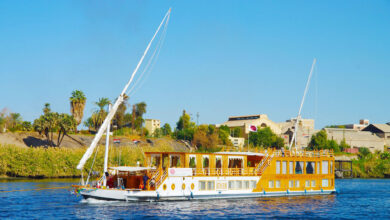The Ultimate Travel Trip Guide: Tips, Tricks, and Must-Know Insights

Traveling isn’t just about visiting new places—it’s about discovering yourself along the way. Whether you’re planning your first trip or you’re a seasoned explorer, having a comprehensive guide can make a world of difference. This ultimate travel trip guide is packed with everything you need to plan, pack, and enjoy your adventure like a pro.
Why Travel Matters
Expanding Your Horizons
Travel allows you to see the world in a way no textbook or video can match. When you step out of your familiar environment, you start noticing how diverse and beautiful the world truly is. Every destination introduces new cultures, languages, architecture, and traditions. Ever walked through the chaotic streets of Bangkok, or felt the tranquil breeze of the Amalfi Coast? These experiences broaden your perspective, making you more open-minded and culturally aware.
When you interact with people from different backgrounds, you realize how connected we all are, despite our differences. Travel teaches tolerance, empathy, and appreciation—qualities the world can never have enough of. It’s not just about Instagrammable moments; it’s about stepping out of your comfort zone and embracing the unknown.
Boosting Mental Wellness
Besides being exciting, travel is therapeutic. It’s one of the best ways to recharge your mental batteries. A change of scenery can do wonders for your mindset. Whether it’s the serenity of a beach or the buzz of a bustling city, travel pulls you out of the daily grind.
Studies have shown that taking regular trips can reduce stress, boost creativity, and even improve your mood long after you return. You’re not just seeing new places—you’re resetting your brain. Traveling also helps you build confidence. Navigating new cities, trying unfamiliar foods, or overcoming language barriers gives you a sense of achievement and self-reliance that’s hard to match.
Planning Your Travel Trip
Choosing the Perfect Destination
Picking where to go is half the fun—and half the challenge. Ask yourself a few simple questions: What’s your budget? Do you want a relaxing beach holiday, a cultural city break, or an adventure-packed hiking trip? The answers will narrow down your options quickly.
Also, think about the time of year. For instance, Europe is gorgeous in the summer but can be crowded and pricey. Southeast Asia? Amazing during dry season but tricky in monsoon. Use travel blogs, social media, and Google Maps to explore potential destinations. Reviews and personal stories often reveal places you wouldn’t find in a typical guidebook.
Don’t forget to check entry requirements. Do you need a visa? Are there health regulations or travel advisories? A little research now can save you a big headache later.
Setting a Realistic Budget
Budgeting might not be the most glamorous part of travel, but it’s one of the most crucial. Start with the big stuff: flights and accommodation. Then, factor in daily expenses like food, transport, entrance fees, and a little extra for shopping or emergencies.
Apps like Trail Wallet or Mint can help you keep track of your spending. Also, be honest with yourself. If you’re on a tight budget, you might need to cut down on luxury hotels or fancy dinners. But that doesn’t mean compromising fun—some of the best travel experiences are free or cheap, like hiking to a viewpoint or exploring a street market.
Pro tip: always have a “cushion” fund—unexpected expenses always pop up, whether it’s a surprise fee or an irresistible souvenir.
Booking Flights and Accommodations
When it comes to flights, flexibility is your best friend. Use comparison sites like Skyscanner or Google Flights and play around with dates to find the best deals. Sometimes, flying mid-week or at odd hours can save you hundreds. Booking 1–3 months in advance is usually the sweet spot.
For accommodations, think about your priorities. Do you want a luxury resort, a budget hostel, or a cozy Airbnb? Check reviews, location, and amenities before booking. Try to stay in central areas close to public transport—it’ll save you time and money on commuting.
And don’t overlook alternative options. House-sitting, camping, or couchsurfing can offer unique and budget-friendly stays that traditional hotels can’t match.
Packing Like a Pro
Must-Have Travel Essentials
Packing can make or break your trip—forget your charger or passport, and you’re in trouble. Make a checklist early, and stick to it. Your essentials should include:
- Passport, ID, and travel documents (keep digital copies too)
- Local currency and a travel-friendly credit card
- Phone charger, universal adapter, and power bank
- Lightweight clothing and versatile shoes
- Toiletries in travel-sized containers
- Basic medicine and first-aid kit
Depending on where you’re going, you might also need insect repellent, sunscreen, or cold-weather gear. Don’t forget entertainment—books, downloaded movies, or a travel journal can be lifesavers during long transit hours.
Packing Hacks to Save Space
Overpacking is the enemy of good travel. You don’t need a different outfit for every day—mix and match clothes that work for multiple occasions. Roll your clothes instead of folding them—it saves space and reduces wrinkles.
Use packing cubes to organize everything. They keep your bag tidy and make it easier to find stuff without unpacking everything. Shoes? Stuff them with socks or small items. Jewelry? Use a pillbox or wrap pieces in cling film to avoid tangling.
Always pack a spare set of clothes in your carry-on, just in case your luggage is delayed. And leave some space—you’ll definitely bring souvenirs or local treats back home.
Navigating Transportation
Local Transit vs. Rental Cars
Getting around once you’ve reached your destination is another big part of your travel experience. Depending on where you are, local transportation might be your best friend—or a total headache. In most cities, public transit like buses, subways, and trams are affordable, efficient, and a great way to get a feel for local life. Apps like Citymapper and Google Maps are incredibly helpful in navigating routes and schedules.
However, if you’re traveling somewhere more remote or you’re planning to explore at your own pace, renting a car might be the better choice. Road-tripping through places like New Zealand, Iceland, or the American Southwest gives you the freedom to stop at every scenic spot and hidden gem. Just make sure to research driving laws, insurance requirements, and whether you’ll need an international driving permit.
And don’t forget about rideshares and taxis. In many cities, Uber or local equivalents are safe, cheap, and convenient. Just be cautious late at night and always check reviews of taxi services before hopping in.
Tips for Smooth Airport Experiences
Airports can be chaotic, especially during peak seasons. But with a little planning, you can glide through like a seasoned traveler. First off, always arrive early—at least two hours before domestic flights and three for international ones. Check in online and download your boarding pass to save time.
Pack your liquids in a clear ziplock and have electronics easily accessible for security. Wear slip-on shoes, avoid belts, and empty your pockets before getting in line. Little things add up.
If you’re traveling often, consider getting TSA PreCheck, Global Entry, or a priority pass lounge membership. It makes a world of difference. And never underestimate the power of an airport lounge—free Wi-Fi, snacks, and comfortable seats can turn a layover into a mini vacation.
Always keep essentials like your passport, wallet, and charger in your carry-on. And make a habit of checking your gate, boarding time, and flight status every hour. Delays or changes can happen anytime, and you don’t want to miss announcements.
Exploring Like a Local
Finding Hidden Gems
Sure, hitting the big tourist spots is great—you should absolutely see the Eiffel Tower or the Great Wall. But the real magic often lies in the hidden corners of a place: the little alley cafés, quiet temples, quirky bookstores, and offbeat art spaces that locals frequent but tourists often miss.
To find these gems, skip the generic travel websites and dive into Reddit threads, local blogs, and social media hashtags. Ask locals, your Airbnb host, or someone at a neighborhood coffee shop where they hang out. You’ll usually get a more honest, authentic recommendation than from any tour brochure.
Walking around with no set plan is another great way to discover surprises. You’ll stumble upon charming streets, random food stalls, and maybe even an impromptu music performance. Traveling slowly and staying curious is the key to finding experiences that don’t make it to travel guides.
Eating Local Cuisine
One of the best parts of travel? The food. Whether you’re slurping pho in Vietnam, enjoying tapas in Spain, or munching street tacos in Mexico, local cuisine offers a crash course in culture.
Don’t just eat at the fancy spots—hit the markets, food stalls, and neighborhood diners. These places usually serve the most authentic dishes at a fraction of the cost. And if you’re not sure what to order, just point at what the locals are having—it’s usually a safe (and delicious) bet.
Be adventurous but cautious. Try new dishes, but avoid sketchy water and raw food in areas where hygiene might be an issue. Carry medication just in case, and drink bottled or filtered water.
Taking a local cooking class or food tour is also a great way to connect with the culture on a deeper level. You’ll learn the stories behind the dishes, and maybe even bring a few new recipes back home with you.

Staying Safe While Traveling
Being Aware of Local Laws and Customs
Every destination comes with its own set of rules—some written, some unspoken. What’s acceptable in your country might be completely taboo elsewhere. Before you go, spend a little time understanding the local laws and customs. For instance, chewing gum in Singapore is illegal, and public displays of affection are frowned upon in some Middle Eastern countries.
Dress codes are another thing to keep in mind. In some cultures, it’s respectful (and sometimes mandatory) to cover your shoulders or knees, especially when entering temples or religious sites. Not respecting these norms can not only make you stand out—in the worst-case scenario, it might even get you fined or arrested.
Knowing a few basic phrases in the local language like “thank you,” “hello,” or “help” goes a long way. It shows respect and can be extremely helpful in a pinch. When the language barrier becomes challenging, Google Translate and other alternatives to Google Translate offer excellent offline translation apps that can help you navigate tricky situations with confidence.
Keeping Your Belongings Secure
Pickpocketing and scams are unfortunately part of the travel experience, especially in tourist-heavy areas. Always be aware of your surroundings, especially in crowded places like markets, train stations, or festivals. Wear a money belt or a crossbody bag with anti-theft features, and avoid keeping valuables in your back pocket.
Split up your money and store emergency cash in a separate spot from your wallet—like a sock, shoe, or hidden pocket in your backpack. Never flash expensive jewelry, gadgets, or wads of cash. It makes you an easy target.
Make digital and physical copies of important documents like your passport, travel insurance, and flight info. Email a copy to yourself and a trusted friend or family member. If you lose something, having backups will make things much smoother.
Budget Travel Tips
Finding Affordable Accommodations
Traveling on a budget doesn’t mean you have to stay in dingy motels or overcrowded hostels. There are plenty of affordable, clean, and even stylish options if you know where to look. Hostelworld and Booking.com offer reviews and filters to help you find places that fit your budget. Airbnb can also be a great deal, especially if you’re staying longer or traveling with a group.
Look out for deals and loyalty programs. Some hotel chains and booking platforms offer discounts for repeat customers or longer stays. And don’t forget to compare prices directly on a hotel’s own website—you might score a better deal or free upgrades.
If you’re feeling adventurous, consider house-sitting or work-exchange programs. You can stay in someone’s home for free while they’re away, or exchange a few hours of work for a free bed and meals.
Eating Well on a Budget
Eating local doesn’t just offer the most authentic experiences—it’s also the most affordable. Street food, local markets, and mom-and-pop restaurants usually offer delicious meals at a fraction of what you’d pay at a tourist restaurant.
If your accommodation has a kitchen, consider cooking a few meals. Shopping at a local market and whipping up your own version of a regional dish is not only cheaper, but also a lot of fun. Pack some snacks from home too—protein bars, trail mix, or instant noodles can be lifesavers when you’re low on cash or stuck in transit.
Many cities also have free or cheap food tours. These are awesome ways to taste your way through a new place without blowing your budget. And keep an eye out for happy hours and lunch specials—they’re often way cheaper than dinner menus.
Making Memories That Last
Capturing the Best Moments
Sure, snapping photos for Instagram is great, but don’t forget to live in the moment too. Take pictures, record videos, but also take time to really soak it all in. Smell the ocean breeze, listen to the chatter in a street market, taste that weird-looking fruit—engage all your senses. That’s what makes the memories stick.
If you’re serious about photography, consider learning the basics before your trip. A little knowledge about lighting and angles goes a long way. But don’t stress too much about getting the “perfect” shot. The best moments are often the unexpected ones—like getting caught in the rain or stumbling upon a random festival.
Also, consider keeping a travel journal. Writing down what you felt, saw, and did every day helps you remember the little things you might forget later. Apps like Day One or even a simple notebook work wonders.
Connecting With People You Meet
Some of the most unforgettable parts of travel are the people you meet along the way. From fellow travelers to generous locals, the connections you make can leave a lasting impact. Be open to conversations—even if they’re awkward at first. A simple “Where are you from?” can lead to deep chats and lifelong friendships.
Join group tours, cooking classes, or hostel activities to meet others. Even solo travelers can find community if they make a little effort. And if someone goes out of their way to help you, consider paying it forward—travel kindness is contagious.
Exchange contact info, follow each other on social media, and keep in touch. A year later, you might find yourself visiting a friend in their hometown, or reconnecting on your next big adventure.
Sustainable and Responsible Travel
Minimizing Your Environmental Impact
Traveling the world is a privilege—and with that comes responsibility. The choices we make as travelers have a direct impact on the planet. One of the biggest issues in tourism today is sustainability. Fortunately, small decisions can lead to big changes.
Start by choosing eco-friendly transportation when you can. Walking, biking, or using public transit not only reduces your carbon footprint but also gives you a better feel for the local culture. When flying is necessary, consider direct flights (they use less fuel than connecting ones) and offset your carbon emissions through reputable programs.
Avoid single-use plastics by carrying a reusable water bottle, utensils, and tote bag. Many destinations now have refill stations, and some even offer water purification services. Skip the plastic straws and say no to unnecessary packaging whenever possible.
Accommodations also matter. Stay in eco-certified hotels or guesthouses that prioritize sustainability. These places often recycle, use solar energy, or source their food locally. And always respect nature—don’t litter, feed wild animals, or go off marked trails in parks or protected areas.
Supporting Local Communities
Travel isn’t just about seeing sights—it’s about connecting with people. And one of the best ways to do that is by supporting the communities you visit. Spend your money where it matters: shop from local artisans, eat at family-owned restaurants, and book tours run by locals rather than large corporations.
Avoid activities that exploit animals or people. Skip the elephant rides, tiger selfies, or sketchy volunteer programs. Instead, seek out ethical wildlife sanctuaries, cultural exchanges, or community-based tourism initiatives.
When you give back to the communities that welcome you, your trip becomes more meaningful—for you and for them. Plus, it helps preserve these places for future generations of travelers.
Conclusion: The Journey is the Destination
A travel trip isn’t just about ticking destinations off a list—it’s about the stories you collect, the people you meet, and the personal growth you experience along the way. Whether you’re off on a weekend getaway or a round-the-world journey, the key is to stay curious, open-minded, and present.
Every trip is a chance to learn—not just about the world, but about yourself. So pack your bags, embrace the unexpected, and remember: the best travel stories often come from the detours, not the destination.
Bon voyage, and may your journey be full of adventure, discovery, and unforgettable memories.




